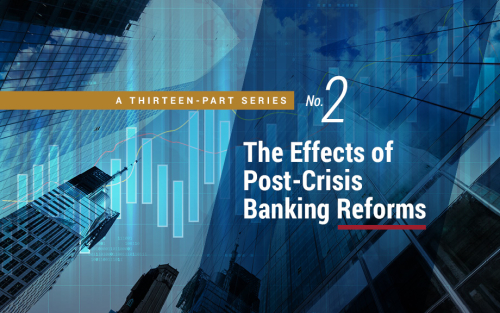Regulatory Changes and the Cost of Capital for Banks

In response to the financial crisis nearly a decade ago, a number of regulations were passed to improve the safety and soundness of the financial system. In this post and our related staff report, we provide a new perspective on the effect of these regulations by estimating the cost of capital for banks over the past two decades. We find that, while banks’ cost of capital soared during the financial crisis, after the passage of the Dodd-Frank Act (DFA), banks experienced a greater decrease in their cost of capital than nonbanks and nonbank financial intermediaries (NBFI).
How Do the Fed’s MBS Holdings Affect the Economy?

In our previous post, we discussed the meaning of the term “credit allocation” and how it relates to the Federal Reserve’s holdings of agency mortgage-backed securities (MBS). We concluded that the Fed’s MBS holdings do not pose significant credit risk but that the Fed does influence the relative market price of credit when it purchases agency MBS, and this indirectly influences decisions by investors. Today, we take the next step and discuss how the Fed’s MBS purchases affect the U.S. economy and, in particular, how the effect of MBS purchases can differ from the effect of purchases of Treasury securities.
What Drives International Bank Credit?
A major question facing policymakers is how to deal with slumps in bank credit.
The Rapidly Changing Nature of Japan’s Public Debt
Japan’s general government debt-to-GDP ratio is the highest of advanced economies, due in part to increased spending on social services for an aging population and a level of GDP that has not increased for two decades.
Are BHCs Mimicking the Fed’s Stress Test Results?
Angela Deng, Beverly Hirtle, and Anna Kovner In March, the Federal Reserve and thirty-one large bank holding companies (BHCs) disclosed their annual Dodd-Frank Act stress test (DFAST) results. This is the third year in which both the BHCs and the Fed have published their projections. In a previous post, we looked at whether the Fed’s […]
Are BHC and Federal Reserve Stress Test Results Converging? What Do We Learn from 2015?
In March, the Federal Reserve and thirty-one large U.S. bank holding companies (BHCs) announced results of the latest Dodd-Frank Act-mandated stress tests. Some commentators have argued that BHCs, in designing their stress test models, have strong incentives to mimic the Fed’s stress test results, since the Fed’s results are an integral part of the Federal Reserve’s supervisory assessment of capital adequacy for these firms. In this post, we look at the 2015 stress test projections by the eighteen largest U.S. BHCs and by the Fed and compare them to similar numbers from 2013 and 2014. As stress testing becomes more established, do we see evidence that the BHCs are mimicking the Fed?
Bank Capital and Risk: Cautionary or Precautionary?
Do riskier banks have more capital? Banking companies with more equity capital are better protected against failure, all else equal, because they can absorb more losses before becoming insolvent.
Income Evolution at BHCs: How Big BHCs Differ
As noted in the introduction (add link) to this series, over the past two decades financial intermediation has evolved from a traditional, bank-centered system to one where nonbanks play an increasing role. For my contribution (add link) to the series, I document how the sources of bank holding companies’ (BHC) income have evolved.
CCAR: More than a Stress Test
The Federal Reserve recently released the results of its latest stress test of large bank holding companies (BHCs).















 RSS Feed
RSS Feed Follow Liberty Street Economics
Follow Liberty Street Economics